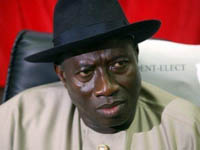Power of Temporary Nigerian Ruler Is Under Cloud
Some supporters of Nigerian President Umaru Yar'Adua plan a legal challenge to the appointment of vice president Goodluck Jonathan as acting leader. Nigerian lawmakers made the move more than ten weeks after President Yar'Adua left for medical treatment in Saudi Arabia.

In a nationwide address accepting his appointment, Mr. Jonathan acknowledged the unusual nature of Tuesday's parliamentary vote making him acting leader.
"The circumstances in which I find myself assuming office today as acting president of our country are uncommon, sober, and reflective," he said. "More than ever, therefore, I urge all Nigerians as a people of faith in God to pray fervently for the full recovery of our dear president and his early return."
Nigeria's constitution says parliament may transfer temporary power to the vice president whenever the president notifies them in writing that he is going on vacation or is otherwise unable to discharge the functions of his office.
But President Yar'Adua did not write to lawmakers before leaving in late November. So parliament acted instead on the basis of a radio interview in which the president confirmed that he is in Saudi Arabia for medical treatment.
Nigeria's Bar Association says such a move is not backed by the constitution. The country's Action Congress party says it is the "height of illegality."
Senator Yakubu Garba Lado is from President Yar'Adua's home state of Katsina. He says lawmakers exceed their power in making Mr. Jonathan the acting leader and believes his appointment will be overturned in court.
Senate President David Mark says that authority comes from the doctrine of necessity. "The doctrine of necessity requires that we do what is necessary when faced with a situation that was not contemplated by the constitution. And that is precisely what we have done," he said.
Mark says the appointment in no way weakens Nigeria's commitment to constitutional order.
The Economic Community of West African States says it is pleased by the development.
"The institutions in Nigeria are very strong," said Mahamane Toure, the ECOWAS Commissioner for Political Affairs. "This is exactly the type of development we would like to see in other members states whereby the institutions, civil society, the press, the whole media comes out to take ownership of a democratic process and makes sure that rules are abided by when they are agreed by the majority of the citizens."
Asked about the legality of Mr. Jonathan's appointment, Toure says ECOWAS believes the situation is being handled properly by the proper institutions and that, in the end, the interests of Nigerian citizens will be protected.
Voice of America has contributed to the report.
Subscribe to Pravda.Ru Telegram channel, Facebook, RSS!


